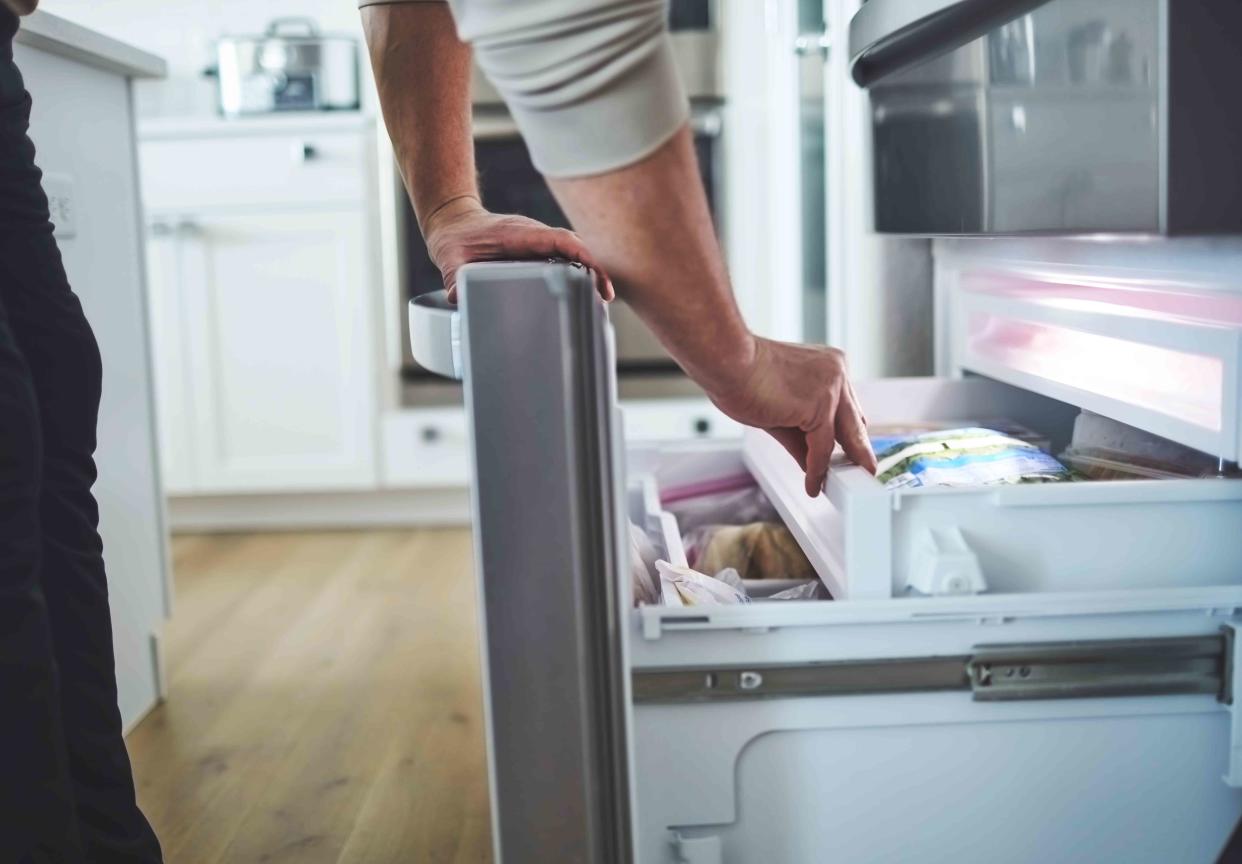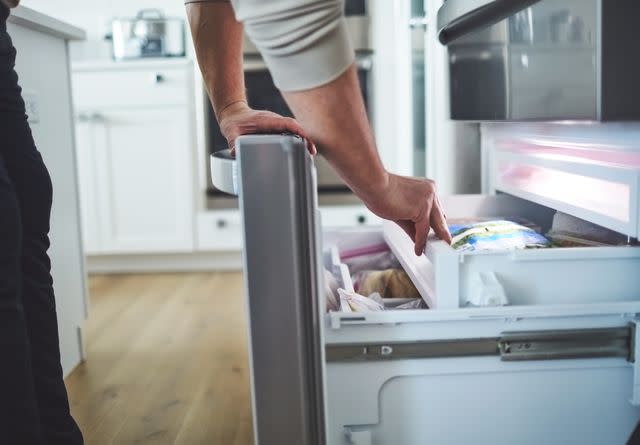Frozen Strawberries and Hepatitis A Risk: What to Do If You Have Recalled Products at Home

Getty Images / CatLane
The FDA announced voluntary recalls on some frozen strawberry products from California Splendor, Inc., and Scenic Fruit Company, due to hepatitis A infections.
The recalled products were sold nationwide, including at Costco and Trader Joe’s stores.
Experts recommend people protect themselves by washing their hands and their produce, and by making sure they’ve received a hepatitis A vaccination.

Getty Images / CatLane
Two companies are issuing voluntary recalls of their organic frozen strawberries, as they may be behind five cases of viral hepatitis A infections, the Food and Drug Administration (FDA) said on Friday.
The FDA has launched an outbreak investigation into hepatitis A infections, and subsequently two companies—California Splendor, Inc., and Scenic Fruit Company—have issued voluntary recalls of some frozen strawberry products. These include brands such as Kirkland Signature, sold at some Costco stores, and self-branded Trader Joe’s Organic Tropical Fruit Blend.
All five hepatitis A cases linked to the frozen strawberries have occurred in Washington state. The Centers for Disease Control and Prevention noted that it is possible more people may have experienced symptoms from the recalled product and left them unreported.
The hepatitis A virus has not yet been found in any of the products, though each individual who became sick reported eating frozen strawberries before falling ill.
“Five cases—they pulled the product. They don’t want [anyone] to get it, because it’s a public health hazard,” Robert Fontana, MD, professor of internal medicine in the division of gastroenterology and hepatology at Michigan Medicine, told Health. “You can be totally well and it doesn’t matter how healthy you are—you can get sick as an adult.”
Here’s what experts had to say about when hepatitis A can be dangerous, and how to avoid getting sick from the foods we eat.
What Is Hepatitis A?
Hepatitis A is a foodborne illness that attacks the liver, Chloe Thio, MD, professor of medicine in the division of infectious diseases at Johns Hopkins Medicine, told Health.
“The virus goes to the liver cells,” she explained. “In most situations, your immune system will just get rid of the virus. Some people will not have any symptoms from this, and some people will have severe liver cell breakdown.”
Hepatitis A is spread through the fecal-oral route, Dr. Thio noted, which means that someone becomes infected after they accidentally ingest blood or stool that contains the virus.
In the case of these frozen strawberries, the fruit likely became contaminated with the hepatitis A virus sometime during the growing or production process, Dr. Thio added, though the FDA has not named the exact source of the contamination. It’s possible that some of the people working with the berries were infected with hepatitis A while handling the produce, or contaminated water was used to irrigate the plants.
“These food-related outbreaks—oftentimes from contaminated produce—they pop up around the country every year or two,” Dr. Fontana explained. “It’s usually self-limited because the FDA and the CDC get involved and they can pinpoint it, pull the product.”
This outbreak is linked to another hepatitis A outbreak in fresh strawberries that happened about 10 months ago that appears to have originated in the same location—Baja California, Mexico. It’s possible that other government agencies may need to further investigate growing practices in this region to insure that this won’t happen again, suggested Dr. Fontana.
Hepatitis A can be fairly contagious, causing a number of cases if people continue to ingest contaminated food or water. It can spread from person to person, though that requires close personal contact. It’s unlikely the U.S. would see a large-scale, person-to-person outbreak of hepatitis A, in the way that we saw with COVID, Dr. Fontana clarified.
No one has gotten sick since late December, but hepatitis A symptoms can show up anywhere from 15 to 50 days after eating or drinking something contaminated. More cases could be possible.
Related:How Is Hepatitis C Diagnosed?
How to Avoid Getting Sick
Though the recall was broad, that doesn’t necessarily mean that every single bag of organic frozen strawberries contains hepatitis A, Dr. Thio explained.
The frozen strawberries are unlikely to cross-contaminate other foods in a person’s fridge, and it may even be safe to eat if someone were to kill the virus on the fruit by cooking it at high temperatures, Dr. Thio continued.
However, in cases like these, it’s better to be safe than sorry.
“I wouldn’t eat them,” Dr. Thio said. “You could wash them, but there could still be some hepatitis A on the fruit, because it can live in the nooks and crannies, especially in strawberries.”
The severity of hepatitis A infection varies, but symptoms can in some cases be intense. Some people may experience:
Yellow skin or eyes
Stomach pain
Fever
Dark urine or light-colored stools
Diarrhea
Joint pain
Hepatitis A infections can also be a bit more concerning for people who are older, those who are immunocompromised, or those who have other liver conditions, Drs. Fontana and Thio agreed. Among these more at-risk groups, people could, in rare cases, get liver failure or could even die from the infection.
Beyond the symptoms, hepatitis A outbreaks are also dangerous because infected people could pass hepatitis A to the other members of their household, or customers if they’re in food service, said Scott Meschke, PhD, professor in the department of environmental and occupational health science at the University of Washington School of Public Health.
People are most infectious in the one to two weeks before they start to develop symptoms, which could offer even more opportunities for people to transmit the virus.
The FDA recommends not eating, selling, or serving frozen strawberries included in the recall.
But if someone is concerned that they’ve eaten a contaminated berry, the CDC recommends that they contact their state department as soon as possible. And if someone realizes they’ve been in close contact with others while being possibly infected with hepatitis A, healthcare professionals can help mitigate the situation.
“What’s recommended is that the household contacts—because [hepatitis A is] transmissible—should get a vaccine dose right away within two weeks,” Dr. Fontana said. Some people may also receive an immune globulin treatment in the two weeks after exposure, he added, which helps boost a person’s immune system as a precautionary measure.
This hepatitis A vaccine is probably the best way for people to protect themselves, Meschke and Dr. Fontana agreed. “Hepatitis A used to be a much bigger foodborne issue. And now because this vaccine is so good, we just don’t see as many cases in the foodborne setting as we used to,” Meschke told Health.
The goal isn’t to scare people—recall announcements like these shouldn’t mean that all produce is “suspect,” Meschke added. But they can serve as a reminder that people should continue to protect themselves by washing their hands and their produce, and by making sure they’ve received a hepatitis A vaccination.
Related:Turmeric Supplements Linked to Liver Injury in Rare Cases, New Research Shows
For more Health news, make sure to sign up for our newsletter!
Read the original article on Health.

